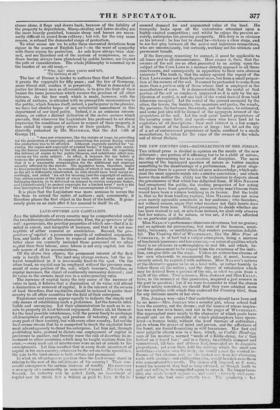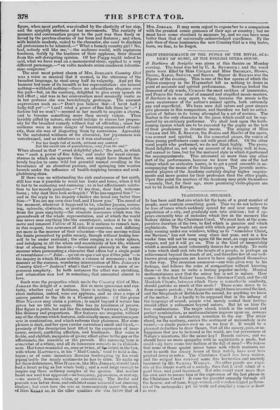THE NEW COUNTRY GIRL — RECOLLECTIONS OF MRS. JORDAN. THE critical press
is divided in opinion on the merits of the new debutante ; one portion of it affirming her to be a child of nature,
the other representing her as a creature of discipline. The mere mooting of the hackneyed question of nature or tuition implies something to the disadvantage of a performance. In great origi nal genius there is a power which all men acknowledge; which subdues the most opposite minds into a similar conviction ; and which leaves them neither the ability nor the inclination to dispute about the genuineness of that which has delighted them. If Miss NELSON had enraptured the public, the sterling properties of her acting would not have been questioned, since in every man's bosom there would have been a witness testifying in its favour. But the truht is, that'so far from kindling rapture, Miss NELSON does not raise even merely agreeable sensations in her audience ; who therefore, not without reason, argue that what reaches not their hearts does not proceed from hers. Without presuming to decide whether she has been trained to act, or acts from instinct, we shall only observe that her nature, if it be nature, or her art, if it be art, afforded us no particular gratification.
Miss NELSON'S performance discovers cleverness, hut no genius; and an aptitude for personating, but none of the humour, sensibility, buoyancy, or mirthfulness that renders personation delight ful. The Country Girl of WITHEEtLEY, like the Miss Przu: of CONGREVE, is at best but a vulgar conception, being a mixture of hoydenish ignorance and low cuunine.,,—a union of qualities which
there is no pleasure in contemplating in real life, and which, be
yond-the amusement to be reaped from the exactness of the imitation, can give little on the stage. Unless an actress has charms of
her own wherewith to recommend the part, it must, however cleverly acted, be regarded with coldness. Miss NELSON'S notions of the character appear to be on a level with, or rather humbly to
follow those of, the author ; and the degree of satisfaction which may be derived from a perusal of the one, is what we gain from a sight of the other. Two actresses, Mrs. JORDAN and Miss KELLY
have, in the memory of this generation, acquired a just renown in the part in question ; but if we were to consider in what the charm
of their acting consisted, we should find they were admired more for the qualities with which they endowed the Country Girl, than for any intrinsic merits of her own.
Mrs, JORDAN was—alas ! that such things should have been and he no more—Mrs. JORDAN was a country girl, whose school had been the country, not the drama ; and the source of whose inspira tion was in her own heart, and not in the pages of WYCHERLEY. She approached more nearly to the character of which poets have dreamt and on the possibility of which philosophers have specu lated—a human being, without the least tincture of cultivation ; yet in whom the graces of mind and person, and the affections of
the heart, are found flourishing in wild luxuriance. Her first anti most palpable Charm was in a face, which, as Ciuldie Headrigg says of his master's, seemed "made of a fiddle-string, for a' that looked on it loved her;" and in a figure, beautifully compact and symmetrical, till time and dielress hied; innovated on its exquisite proportions ; yet even then, with the mastery which the mind can sometimes extrci.se over the body, she would assert the wonted influence of her charms, and, ;z1; she looked out from her clustering curls with arelmee-; and exhilarating glee, would bewitch even those who remembered Itri youth. The graces still lingered, as it were, round the tenement they had so long adorned, as though loath to quit and wiLing to be compelled again to enter it. No longer beautiful, she made herself appear so, and could !idtrjraldy wen emus_ terfeit whet she had once actually i■ec,n; The eysrirtsetry o her figure, when most perfect, was rivalled by the elasticity of her step, and the sprightly alertness of her movements. The rusticity of manners and conversation proper to the part was thus finely re lieved by the peerless charms of her form and features ; and when, with humble modesty, suited to the character, she used to disclaim all pretensions to be admired,—" What a homely country girl ? No, bud, nobody will like me,"—the audience would, with rapturous fondness, testify by the loudness of their applause, their dissent from this self-derogating opinion. Of her Peggy might indeed be said, what we have read on a monumental stone, applied to a very different personage,—" ex vultu modesto animi candorem lubentissime conjiceres: The next most potent charm of Mrs. JORDAN'S Country Girl was a voice so musical that it seemed, in the utterance of the broadest language, to steal away half its vulgarity. And yet the humour lost none of its breadth in her representation: she minced nothing—withheld nothing—threw no adventitious elegance over the part—but, on the contrary, delighted to give every speech its full effect • and was in her conversation most musically rustic as in her gestures she was bewitchingly grotesque. The coarsest expressions such as—" Don't you believe that—I ha'nt half a belly-full yet"—" Lord what a power of fine folk there be"—" I fackins but we won't"—seemed in her mouth to acquire a charm, and to become something more than merely vulgar. Thus lavishly gifted by nature, she could indulge to excess her propensity for the broadest comedy. without fear of offending ; since her audience were in more danger of becoming enamoured of rusticity, than she was of disgusting them by coarseness. Agreeably to the untutored wildness of the character, her joyousness was unrestrained, and as infectious as it was exuberant ; " For her laugh full of mirth, without any control But the sweet one of gracefulness, rang flynn the soul."
When abroad in that " sweet delightful place," the park, in which was " such a power of fine folks," and under the novel Circumstances in which she appears there, one might have likened this lovely hoyden to some wild but graceful animal revelling in the luxuriance of an abundant pasture, and springing into wanton bounds under the influence of health-inspiring breezes and soulgladdening skies.
If there was no withstanding the rich exuberance of her mirth, still less was it possible to resist her looks and tones, when it fell to her to be endearing and caressing; as in her affectionate salutation to her moody guardian,—" O my dear, dear bud, welcome home ; why dost thou look so fropish ? Who has nagered thee? "— and in the reply to his inquiry whether she loved any better than him—" You are my own dear bud, and I know you." The mood of the moment, whatever it happened to he, whether joyous, caressing, splenetic, obstinate, or pouting, acquired an exquisite relish from the pure simplicity—the absolute innocence which was the groundwork of the whole representation, and of which the world has never seen anything like the counterpart, unless it be in the naive and innocent Val&ie of MARS. It is curious to remark how, in this respect, two actresses of different countries, and differing yet more in the manner of their education—the one moving within the limits prescribed by polite society, though without feeling herself to be under restraint ; the other ranging in a wider sphere, and indulging in all the whim and eccentricity of low life, without fear of abusing her freedom ;—fascinated precisely in the same manner when personating a character that offers but a single point of resemblance:—" Jolie . . qu'est-ce.que c'est que d'être jolie "—is the inquiry in which MARS unfolds a volume of innocence ; in like manner as the curious, wondering interrogation of Mrs. JORDAN'S Country Girl—" Jealous ! what's that ?"—revealed a mine of ingenuous simplicity. In both instances the effect was ravishing, and admiration was lust in something that amounted almost to love.
Such were the properties which made the Country Girl of Mrs. JORDAN the delight of a nation. But in mere ignorance and rusticity, whether real or fictitious, thereis nothing to admire. A close imitation, indeed, wins our applause, and so does a rope of onions painted to the life in a Flemish picture. Of this praise Miss NELSON may claim a portion ; to aught beyond it nature has given her no title to aspire. She has no loveliness of person. Her figure is petite, but not like the inimitable VERTPRE'S, of fairylike delicacy and proportions. Her features are irregular, without any of the charms which features, individually mean, sometimes possess in combination, and which redeems their plainness. Her com plexion is dark, and her eyes (under correction) small and black,— precisely of the description least fitted to the expression of innocence, naiveté, confiding affection, and kindliness. Her voice is feeble, and childish, incapable of giving effect either to the gay or the affectionate, the irascible or the peevish. Her caressing tone is somewhat of a whine, and all its innocence consists in its childishness. Her tones reminded us, once or twice, of the infant in the box, with whom MATTHEWS, in his "Mail Coach," used to hold a dialogue; or of some immature Roscius burlesquing by his weak piping treble the manly sentiments he has to utter. To make up for these deficiences, Miss NELSON, like Mrs. JORDAN, should have had a heart as big as her whole body; and a soul large enough to inspire any three ordinary samples of the species. But neither heart nor soul was apparent—no buoyancy, joyousness, or eestacy, —no naiveté, humour, whim, or eccentricity. The fretful and peevish was better done, and exhibited some natural if not amusing strokes ; but even here she was as immeasurably beiow the mark of Miss Kieia14 its, in the other qualities she WM below that of Mrs. JORDAN. It may seem unjust to expose her to a comparison with the greatest comic geniuses of their age or country ; but we must have some standard to measure by, and we can have none better than that of universally-acknowledged excellence. By the side then of these luminaries the new Country Girl is a tiny lustre, born, we fear, to be forgot.















 Previous page
Previous page